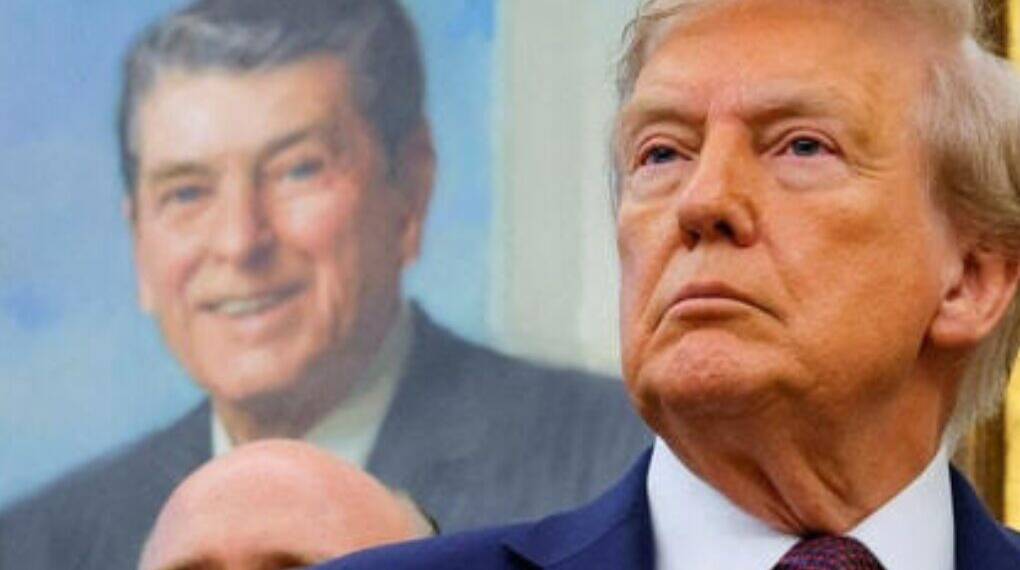In a dramatic escalation of tensions between Washington and Ottawa, United States President Donald Trump on Thursday announced the immediate termination of all trade negotiations with Canada. The move came in response to an anti-tariff advertising campaign by the Government of Ontario that used the late U.S. President Ronald Reagan’s voice and image without authorization.
Trump, who has frequently framed his economic policy around tariffs on steel, aluminum, and automobiles, accused Canada of “fraudulently” using a “fake” version of Reagan’s remarks to undermine his trade stance.
“The Ronald Reagan Foundation has just announced that Canada has fraudulently used an advertisement, which is FAKE, featuring Ronald Reagan speaking negatively about tariffs,” Trump posted on Truth Social. “Based on their egregious behaviour, ALL TRADE NEGOTIATIONS WITH CANADA ARE HEREBY TERMINATED.”
The decision effectively halts weeks of bilateral talks aimed at resolving disputes stemming from Trump’s earlier tariff measures on Canadian steel, aluminum, and automobiles.
The Advertisement Controversy
The advertisement in question, funded by the Government of Ontario, features clips from Reagan’s 1987 presidential radio address titled “Address to the Nation on Free and Fair Trade.” The campaign sought to highlight the dangers of tariffs, portraying them as economically damaging and counterproductive—a message that runs contrary to Trump’s protectionist policies.
In the ad, Reagan’s voice declares, “High tariffs inevitably lead to retaliation by foreign countries and the triggering of fierce trade wars. Then the worst happens: markets shrink and collapse; businesses and industries shut down; and millions of people lose their jobs.” The clip concludes with Reagan saying, “Throughout the world, there’s a growing realisation that the way to prosperity for all nations is rejecting protectionist legislation and promoting fair and free competition. America’s jobs and growth are at stake.”
While the words are authentic, they were selectively edited and rearranged, altering their original sequence and context. Analysts argue that this selective editing gives the false impression that Reagan’s message universally condemned tariffs, ignoring that the same 1987 address also defended limited, strategic tariffs on Japanese imports as a “special case.”
Response from the Ronald Reagan Foundation
The Ronald Reagan Presidential Foundation quickly issued a formal statement condemning the use of Reagan’s likeness and voice in the Canadian advertisement. The foundation stated that the ad “misrepresents the Presidential Radio Address” and that the Government of Ontario “did not seek nor receive permission” to use or edit the remarks. It also confirmed that legal action is being considered against the advertisers.
The foundation’s statement added that while Reagan did advocate free and fair trade, he simultaneously recognized the need for measured tariff actions under specific economic conditions, particularly to address unfair trade practices by foreign competitors.
Broader Political Fallout
Trump’s decision to end trade negotiations with Canada marks a significant setback in U.S.-Canada economic relations, which had recently shown signs of stabilization following months of tariff disputes. The Ontario government has yet to respond officially to Trump’s announcement, but Canadian federal officials privately expressed concern that the dispute could further strain bilateral trade worth hundreds of billions of dollars annually.
Political observers view Trump’s move as a calculated message to both domestic and international audiences, reinforcing his image as a hardline defender of American manufacturing. The episode also underscores how the legacy of Ronald Reagan—long considered a conservative icon of free-market policy—continues to shape and divide Republican economic ideology.
Historical Context
In his original 1987 radio address, Reagan discussed ongoing trade tensions with Japan, acknowledging that he had recently imposed tariffs on some Japanese imports. However, he warned against excessive protectionism and emphasized that long-term economic growth relied on open markets and fair competition.
Reagan’s nuanced position—advocating both free trade and temporary tariffs to correct unfair practices—contrasts sharply with Trump’s zero-tolerance approach toward trade deficits.
The fallout from this controversy could have immediate repercussions on North American trade dynamics. Economists warn that terminating talks may stall cooperation on critical sectors such as automobiles, energy, and technology. Furthermore, it risks deepening political rifts as Canada prepares to reassess its trade strategies amid renewed U.S. unpredictability.
For now, Trump’s decision signals a renewed embrace of unilateralism in trade policy, while the use of Reagan’s legacy in modern political messaging highlights how the past continues to influence present-day geopolitics.








